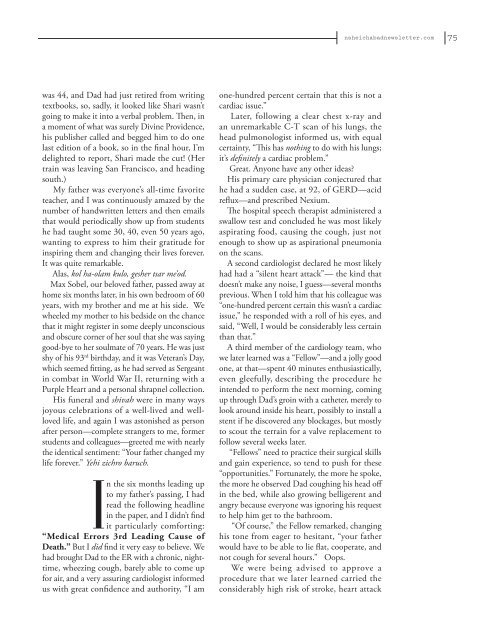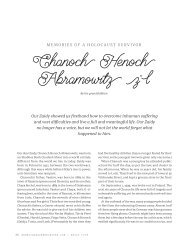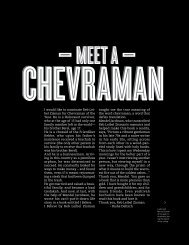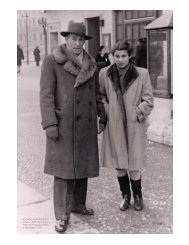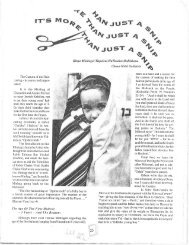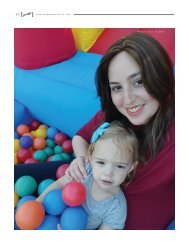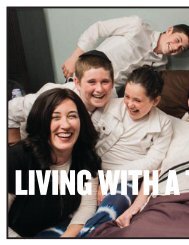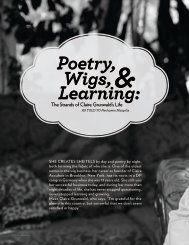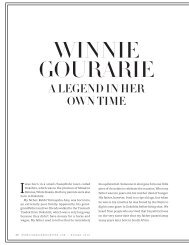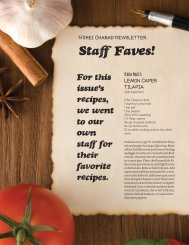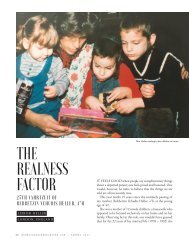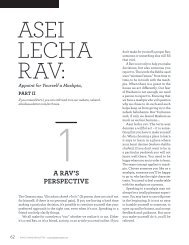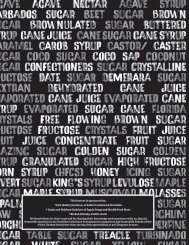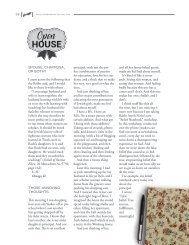Farewell to My Father, by Eliezer Sobel
- No tags were found...
You also want an ePaper? Increase the reach of your titles
YUMPU automatically turns print PDFs into web optimized ePapers that Google loves.
nsheichabadnewsletter.com<br />
75<br />
was 44, and Dad had just retired from writing<br />
textbooks, so, sadly, it looked like Shari wasn’t<br />
going <strong>to</strong> make it in<strong>to</strong> a verbal problem. Then, in<br />
a moment of what was surely Divine Providence,<br />
his publisher called and begged him <strong>to</strong> do one<br />
last edition of a book, so in the final hour, I’m<br />
delighted <strong>to</strong> report, Shari made the cut! (Her<br />
train was leaving San Francisco, and heading<br />
south.)<br />
<strong>My</strong> father was everyone’s all-time favorite<br />
teacher, and I was continuously amazed <strong>by</strong> the<br />
number of handwritten letters and then emails<br />
that would periodically show up from students<br />
he had taught some 30, 40, even 50 years ago,<br />
wanting <strong>to</strong> express <strong>to</strong> him their gratitude for<br />
inspiring them and changing their lives forever.<br />
It was quite remarkable.<br />
Alas, kol ha-olam kulo, gesher tsar me’od.<br />
Max <strong>Sobel</strong>, our beloved father, passed away at<br />
home six months later, in his own bedroom of 60<br />
years, with my brother and me at his side. We<br />
wheeled my mother <strong>to</strong> his bedside on the chance<br />
that it might register in some deeply unconscious<br />
and obscure corner of her soul that she was saying<br />
good-<strong>by</strong>e <strong>to</strong> her soulmate of 70 years. He was just<br />
shy of his 93 rd birthday, and it was Veteran’s Day,<br />
which seemed fitting, as he had served as Sergeant<br />
in combat in World War II, returning with a<br />
Purple Heart and a personal shrapnel collection.<br />
His funeral and shivah were in many ways<br />
joyous celebrations of a well-lived and wellloved<br />
life, and again I was as<strong>to</strong>nished as person<br />
after person—complete strangers <strong>to</strong> me, former<br />
students and colleagues—greeted me with nearly<br />
the identical sentiment: “Your father changed my<br />
life forever.” Yehi zichro baruch.<br />
In the six months leading up<br />
<strong>to</strong> my father’s passing, I had<br />
read the following headline<br />
in the paper, and I didn’t find<br />
it particularly comforting:<br />
“Medical Errors 3rd Leading Cause of<br />
Death.” But I did find it very easy <strong>to</strong> believe. We<br />
had brought Dad <strong>to</strong> the ER with a chronic, nighttime,<br />
wheezing cough, barely able <strong>to</strong> come up<br />
for air, and a very assuring cardiologist informed<br />
us with great confidence and authority, “I am<br />
one-hundred percent certain that this is not a<br />
cardiac issue.”<br />
Later, following a clear chest x-ray and<br />
an unremarkable C-T scan of his lungs, the<br />
head pulmonologist informed us, with equal<br />
certainty, “This has nothing <strong>to</strong> do with his lungs;<br />
it’s definitely a cardiac problem.”<br />
Great. Anyone have any other ideas?<br />
His primary care physician conjectured that<br />
he had a sudden case, at 92, of GERD—acid<br />
reflux—and prescribed Nexium.<br />
The hospital speech therapist administered a<br />
swallow test and concluded he was most likely<br />
aspirating food, causing the cough, just not<br />
enough <strong>to</strong> show up as aspirational pneumonia<br />
on the scans.<br />
A second cardiologist declared he most likely<br />
had had a “silent heart attack”— the kind that<br />
doesn’t make any noise, I guess—several months<br />
previous. When I <strong>to</strong>ld him that his colleague was<br />
“one-hundred percent certain this wasn’t a cardiac<br />
issue,” he responded with a roll of his eyes, and<br />
said, “Well, I would be considerably less certain<br />
than that.”<br />
A third member of the cardiology team, who<br />
we later learned was a “Fellow”—and a jolly good<br />
one, at that—spent 40 minutes enthusiastically,<br />
even gleefully, describing the procedure he<br />
intended <strong>to</strong> perform the next morning, coming<br />
up through Dad’s groin with a catheter, merely <strong>to</strong><br />
look around inside his heart, possibly <strong>to</strong> install a<br />
stent if he discovered any blockages, but mostly<br />
<strong>to</strong> scout the terrain for a valve replacement <strong>to</strong><br />
follow several weeks later.<br />
“Fellows” need <strong>to</strong> practice their surgical skills<br />
and gain experience, so tend <strong>to</strong> push for these<br />
“opportunities.” Fortunately, the more he spoke,<br />
the more he observed Dad coughing his head off<br />
in the bed, while also growing belligerent and<br />
angry because everyone was ignoring his request<br />
<strong>to</strong> help him get <strong>to</strong> the bathroom.<br />
“Of course,” the Fellow remarked, changing<br />
his <strong>to</strong>ne from eager <strong>to</strong> hesitant, “your father<br />
would have <strong>to</strong> be able <strong>to</strong> lie flat, cooperate, and<br />
not cough for several hours.” Oops.<br />
We were being advised <strong>to</strong> approve a<br />
procedure that we later learned carried the<br />
considerably high risk of stroke, heart attack


